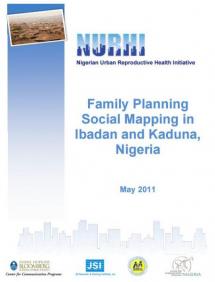Family Planning Social Mapping in Ibadan and Kaduna, Nigeria
The aim of this study was to assess urban community members’ perception about their community boundaries, available health facilities and family planning services, as well as identify places of social interaction.
This study was qualitative in design and relied on participatory social mapping data collection activities. A total of 24 community mapping exercises were conducted between September and October 2010. The groups were stratified by sex, age, wealth, and location.
The findings suggest that most respondents were aware of most health facilities in their communities. Men had a more expansive perception of community landmarks – potentially reflecting their greater mobility in the communities. There was little difference in identified places of social interaction when comparing the older and younger female groups. Social spaces identified included community leaders’ palaces and homes, markets, sport grounds, schools, bars, and places of worship.
The study indicated a need to increase awareness about the locally available family planning service sites in Ibadan. Greater awareness of family planning service sites in Ibadan could potentially improve utilization of family planning services in this city, thereby increasing the contraceptive prevalence rate. Community leaders’ compounds appear to be important social entry points into communities for both men and women, young and old.
Source: Johns Hopkins University Center for Communication Programs, JSI, CCP Nigeria
Date of Publication: March 25, 2019
SIMILIAR RESOURCES
Tools
Examples
- Factors Impacting Use of Health Services by First-time/Young parents: A Formative Research Toolkit
- Desk Review of Programs Integrating Family Planning with Food Security and Nutrition
- Multisectoral Integration of SBC Programming A High-Level Exploration of Integrating Family Planning with Other Development Sectors
- “Because my Husband and I Have Never Had a Baby Before…” Results and Lessons from Interventions with First-Time Parents in Madagascar, Mozambique, and Nigeria
- Engaging Faith Leaders in Family Planning
- Reaching First-Time Parents and Young Married Women for Healthy Timing and Spacing of Pregnancies in Burkina Faso
- HTSP Project Briefs: Niger, Togo
- Making Content Meaningful: A Guide to Adapting Existing Global Health Content for Different Audiences
- Hormonal Contraception and HIV - Technical Update
- Using Data to Design an Evidence-based Social and Behavior Change Program in Rural Nepal

